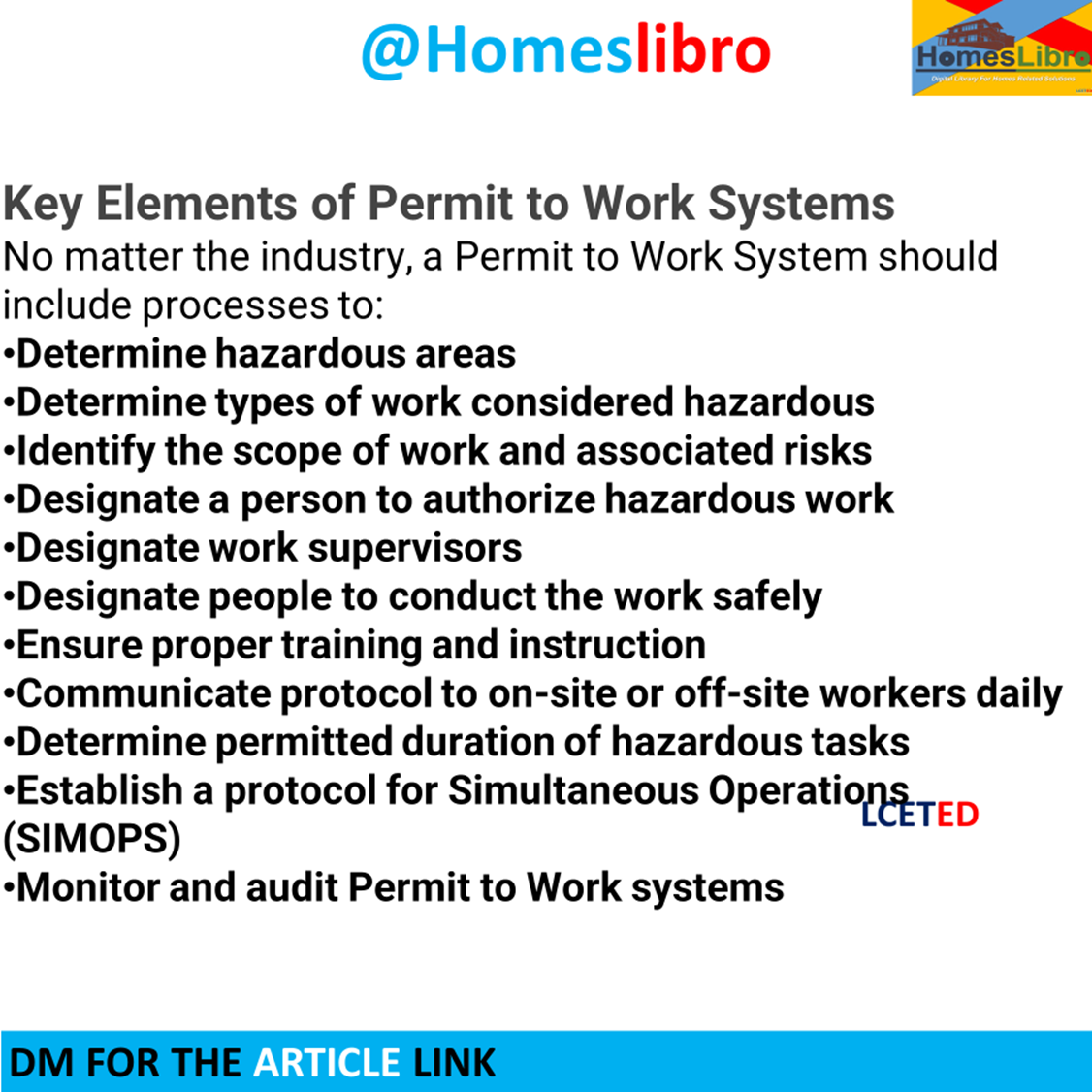What Is a Work Permit?
A
work permit is a written form used to authorize jobs that endanger workers to
serious hazards. It recognizes the work to be done, the hazards involved, and
the necessary preparation and precautions for the job. Examples of jobs
needing work permits are those requiring employees to enter and work in
confined spaces, repair, maintain, or inspect electrical installations, or use large or complex equipment.
A
work permit is a written form used to authorize work that poses serious hazards
to workers. It recognizes the work to be done, the hazards involved, and the
preparation and precautions required for the work. Examples of jobs that
require a work permit include those that require employees to enter and work in
confined spaces, repair, maintain, or inspect electrical installations or use
large or complex equipment.
Why
Use a Work Permit?
If
a job has the potential for serious injury or death, formalization of agreed
work practices is essential. This prevents instructions from being missed, forgotten,
or misunderstood. It also serves as a checklist to ensure that all hazards,
safety measures, work procedures, and general requirements are reviewed and
understood by the assigned employee.
A
work permit is a record of the authorization and completion of a specific work.
Authorization should be given by the competent person after fulfilling all the
necessary conditions.
What
Does a Work Permit Contain?
The
name of the person responsible for the job
The
nature of work
Scope
of work
The
department the person belongs to
The
duration of the job
PPE
required
Name
of the issuer
Risk
assessment documents, if needed
Permit
closing details
Potential
hazards to watch out for
Other
additional permits are needed for the same job
Key
Elements of Permit-to-Work Systems
Different
types of permissions
The
nature of permit-to-work procedures varies depending on the job and the hazards
involved. However, a permission setting is not required to work, for example:
(a)
The assessed risks are low and easily controllable.
(b)
The working method is very simple.
(c)
Other work carried out nearby does not affect the confined space entry or work
involved in the welding process.
However,
where the hazards are high and the work structure is complex and may interfere
with other activities, a formal Permit to Work (PTW) must be used.
Types
of Permits
1. General
work permit
2. Height
work permit
3. Hot
work permit
4. Confined
work permit
5. Riser
& lift Shaft work permit
6. Electrical
work permit
7. Cold
work permit
8. Demolition
Work Permit
9. Excavation
Work Permit
10.
Crane Work permit
11.
Erect/alter/dismantle Work permit
12.
Cut or Core Concrete work permit
13.
Night Work permit
14.
Erect or Dismantle scaffolding Permit
15.
Out of Hours work permit
16.
Live Road Activity Permit
17.
Chemical Work Permit
What
is General Work Permit?
A
general permit must be used for work involving the alteration or alteration of
plant or machinery that may present mechanical, toxic, or electrical hazards;
work on or near overhead crane tracks; work on pipelines with hazardous
contents; Repair of railway tracks, tippers, conveyors; work with
asbestos-based materials; Work involving ionizing radiation; Roof work;
Excavations to bypass underground services.
What
is a Height Work Permit?
Authorization
to work at elevated locations (2 meters above ground) such as ladders,
scaffolding, Mobile Elevated Work Platforms (MEWP), and other off-ground
locations.
What
is Hot Work Permit?
Authorization
to perform work in conditions that create sparks, flames, or any other source
of ignition. Examples of hot work permits include welding, soldering, working
with flammable gases, and other heat-inducing activities.
What
is a Confined work permit?
Authorization
To perform work in conditions is confined space which includes, flues,
excavations, boilers, reactors, chambers, tanks (sealed and open-top), vessels,
furnaces, ducts, sewers, manholes, pits, and ovens. Many fatal accidents have
occurred where inadequate precautions were taken before and during the work
involving entry into confined spaces. - Confined space permit should be taken
for excavations more than 6 feet depth (1.8Mt) which come under the purview of
confined space.
What
is Riser & lift Shaft work permit?
Authorization
to perform work in Riser & lift shaft with all PPE requirements checked and
signed by the authorized person
What
is Electrical work permit?
Authorization
to allow Contractor engaged in electrical Works. Electricity can severely
injure or kill people and can cause damage to buildings and property from the
effect of fires and explosions.
What
is Cold Work Permit?
Any
work that does not require welding or ignition is considered cold work. Cold
working is a plastic deformation process caused by pressing and/or rolling at
room temperature.
In
a typical work environment, cold work activities include working on pipes,
adding values, shovels or vacuums, erecting scaffolding, adding insulation, or doing mechanical or civil maintenance work without the use of flammable materials.
In
some industries, cold work involves working with corrosive materials, resins,
solvents, chemical cleaning, radiation, or electrical equipment.
Any
work permit that establishes guidelines for conducting these cold work
activities in a controlled environment is included in a cold work permit. A
cold work permit contains all the precautions employees must follow when doing
cold work.
What
is Demolition Work Permit?
A
demolition permit is a legal document that gives you the right to demolish any
structure that requires a building permit. But just because a building permit
was not obtained prior to construction does not mean that a demolition permit
is not required. If the building is constructed illegally without permission,
permission is still required to demolish it.
What
is Excavation Permit?
An excavation permit is required for any excavation within the plant. It is necessary to temporarily close the road/block the road or block the main roads in a section or unit. Necessary approval in proper form for "closure of road or site" shall be obtained.











No comments:
Post a Comment